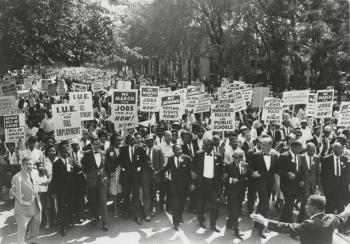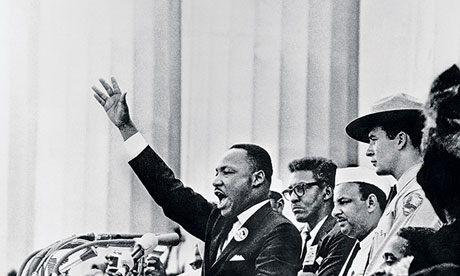In 1963 the racially separate and unequal nation's capital more closely resembled a divided southern city than a showplace of democracy. Beyond the gleaming marble facades of Washington's public buildings sprawled slums as appalling as any in the nation. Within the shadow of the Capitol, more than 40 percent of the city's families lived below the poverty level in a ghetto of rat-infested rooming houses. No other American city exceeded the District of Columbia in rates of infant mortality, venereal disease, and arrests for prostitution and drugs.
And although, as the seat of the federal government, Washington could boast the highest per capita income of any American city, a large portion of its citizens subsisted on welfare. most African-Americans fortunate enough to have jobs in the city held low-paying government jobs or served as the waiters, cooks and maids for the whites in power. Many had no work at all.
It was to the Washington of stately white monuments that civil rights groups planned to march in 1963 to dramatize grass roots support for federal action against racial discrimination and segregation. To improve the chances of the civil-rights bill proposed by President Kennedy, they bypassed the drab streets of the ghetto and rallied on the Mall, the very symbol of American nationhood and democracy.
As the sun rose over Washington on August 28, radio news bulletins predicted that the crowd would fall short of the 100,000 expected. but throughout the morning, a seemingly endless caravan of cars, buses, trains. and planes brought in an estimated quarter-million pilgrims from every part of the country and abroad--powerful evidence of the new consensus in favor of a strong civil-rights act. More than 150,000 blacks mingled with some 75,000 whites on the grassy slopes surrounding the Washington Monument. In the spirit of a church outing, they shared picnic lunches, sang songs of the movement, and then surged toward the Lincoln Memorial, holding aloft banners proclaiming such messages as, "We seek the freedom in 1963 promised in 1863" and "A century-old debt to pay!" Massed along the banks of the reflecting pool, the crowd gloried in its immense size and reveled in the hours of speeches made by African-Americans deploring discrimination and whites confessing guilt over their belated commitment to racial justice.
Finally in the late afternoon, after the wilting Washington heat and humidity had turned their clothes soggy, after many on the fringes of the crowd had withdrawn to the shade of old elms and oaks, the huge assemblage stilled as Martin Luther King, Jr., stood at the lectern in the shadow of the Great Emancipator. In a husky voice, King described the oppression of blacks, promised to continue the struggle until they gained all their civil rights, and in rising tones told the world that African-Americans would never be satisfied as long as they remained victimized by ghettoization and powerlessness. "[We] will not be satisfied," King thundered, "until justice rolls down like the waters and righteousness like a mighty stream." As his followers shouted their approval, King put aside his text and, in the familiar cadence of the southern preacher he was, spoke of a broader vision.
"I have a dream," King chanted again and again (read the full transcript of King's "I Have a Dream" speech here) as the crowd roared amens in response, that someday, in the red hills of Georgia, the sons of former slaves and slave owners could sit together at the table of brotherhood...that even Mississippi could become an oasis maof freedom and justice...that boys and girls of both races in Alabama could join hands "and walk together as sisters and brothers"...where his four children could live in a nation where they'd be judge on the basis of their character and not the color of their skin...that freedom could ring throughout America...that "all God's children, black and white, Jew and Gentile, Protestants and Catholics, will be able to join hands and sing in the words of that old Negro spiritual 'Free at last! Free at last! Thank God almighty, we are free at last!' "
King's oratory on that muggy August afternoon in 1963 did not speed the slow progress of the civil-rights bill through Congress. It did not end racism or erase poverty and despair. It did not prevent the ghetto riots that lay ahead, or the racist backlash that would ultimately smother the civil-rights movement and destroy King himself. But, King had turned a political rally into a historic event. In one of the greatest speeches of history, he recalled America to the ideals of justice and inequality, proclaiming that the color of one's skin ought never be a burden or a liability in American life.
In five years, King would be dead, murdered by a white racist. But, today -50 years later- his dream lives on. It is the promise of America, a vial reminder of what the United States could still be.



Extremely well written, I for one recognize the fact that visiting your site was a valuable action to take. Naturally, especially true today. This observer & scribbler himself doesn't waste time blowing smoke up another author's _ _ _, for that lacks dignity & there is no point to it.
ReplyDelete